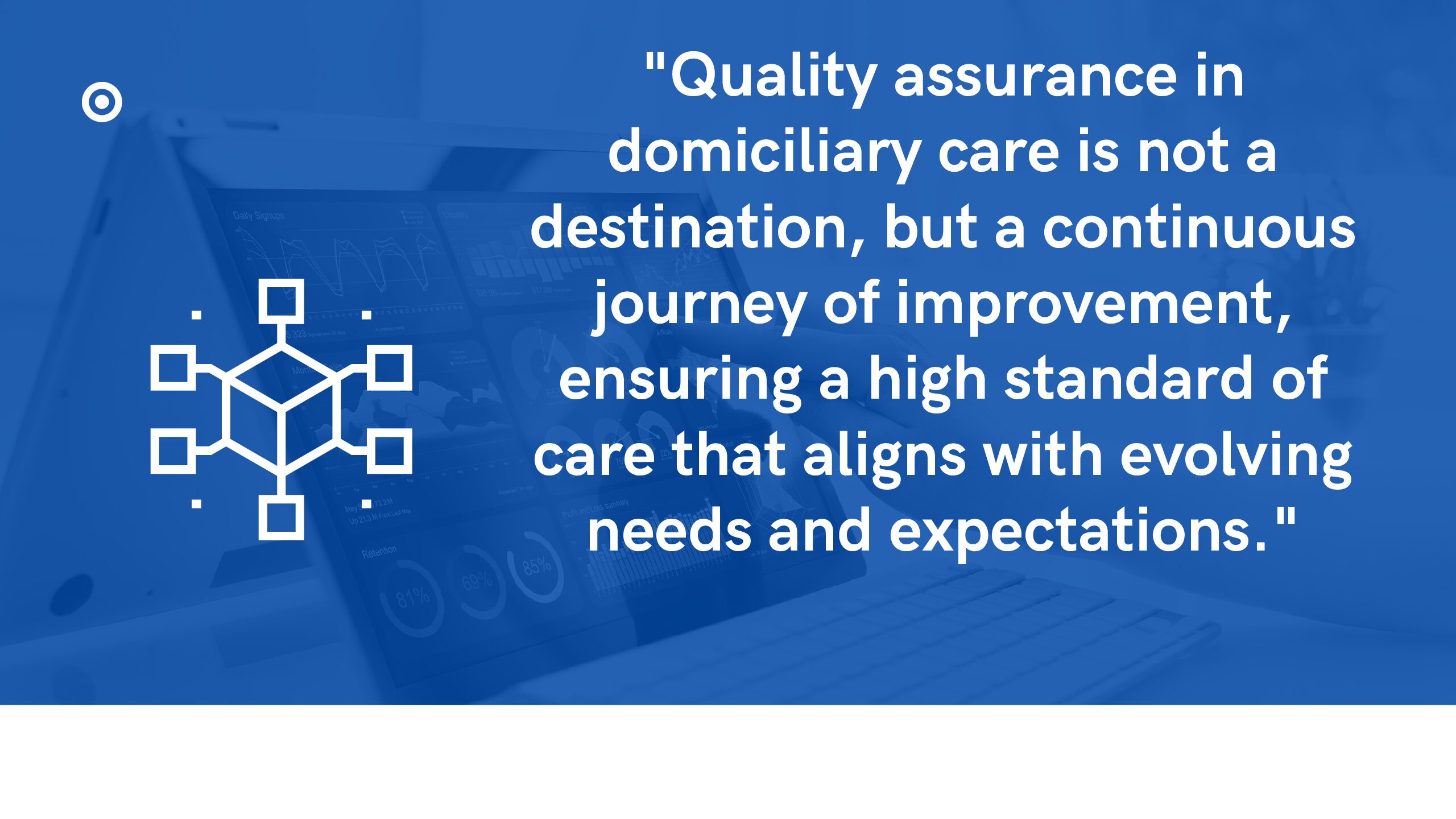In today’s healthcare landscape, domiciliary care, or the provision of healthcare services within a patient’s home, has emerged as a key component of patient-centric care models. The rising need for personalized, home-based care solutions has brought the role of Quality Assurance (QA) into sharp focus.
An effective QA strategy in domiciliary care is instrumental in assessing, maintaining, and improving the quality of care provided, thereby impacting patient satisfaction, caregiver performance, and overall organizational success.
Understanding Quality Assurance in Domiciliary Care
A well-conceived Quality Assurance strategy starts with defining what ‘quality’ represents within the context of your domiciliary care organization. This often entails identifying key performance indicators (KPIs) such as client satisfaction, caregiver retention, and adherence to care plans. These factors help in understanding the efficacy of the care provided and serve as markers to gauge the improvement areas.
Once quality has been aptly defined, it’s essential to develop guidelines and standards for care delivery. These guidelines need to be grounded in best practices, regulatory requirements, and individual client needs. They could span various aspects of care, from client assessments and care planning to medication management, infection control, and communication.
Monitoring performance consistently is another cornerstone of QA in domiciliary care. It involves evaluating the performance of caregivers and other staff members on a regular basis to ensure adherence to established standards. This may be carried out through audits, client record reviews, and garnering feedback from clients and their families.
Feedback is another vital aspect of QA. Regular and constructive feedback to caregivers and other staff members based on performance data aids in highlighting areas for improvement and recognizing strong points. It serves as a motivational tool and a mechanism to enhance performance.
The use of performance data to implement improvements marks a critical step in the QA process. Identifying areas that require enhancement and instituting changes is fundamental to improving the quality of care. This could mean additional training for caregivers, revision of care plans, or bettering communication processes.
QA processes need to be regularly reviewed and adjusted to stay relevant with evolving client needs, staff skills, and regulatory requirements. By integrating these steps into your QA process, your organization can establish a culture of continuous improvement and ensure the provision of high-quality domiciliary care.
Enhancing QA with MyHelpa
Amid these complexities, digital platforms like MyHelpa have emerged as powerful allies in QA. MyHelpa offers a range of features that make domiciliary care management easier and more effective, including tools for managing operations, ensuring compliance, and facilitating staff training. By optimizing these aspects of care, MyHelpa enables domiciliary care providers to exceed QA standards and deliver exceptional care.
The Role of QA Metrics in Domiciliary Care
QA metrics are key to quantifying the quality of care provided and form the foundation of any QA strategy. They facilitate the assessment of care quality, illuminate areas needing improvement, and serve as a guide for future enhancements.
QA metrics can span various areas, from client and caregiver satisfaction surveys to care plan adherence, incident resolution rates, regulatory compliance, and effectiveness of staff communication. By providing a comprehensive view of the care process, these metrics become instrumental in creating a roadmap for continuous improvement.
Client Satisfaction: Measuring satisfaction levels with the care provided, interactions with caregivers, communication processes, and overall experience with the organization.
Caregiver Satisfaction: Assessing job satisfaction, adequacy of training, and support received from the organization can offer insights into caregiver performance and retention.
Care Plan Adherence: Regularly reviewing care documentation ensures caregivers are following the care plan, leading to improved client outcomes.
Incident Reporting: Keeping track of incidents like falls, medication errors, or adverse events can contribute to a safe and trustworthy care environment.
Regulatory Compliance: Ensuring adherence to health, safety, and data protection regulations safeguards clients’ rights and helps avoid legal complications.
Staff Training: Consistent training on relevant topics ensures caregivers are up-to-date and capable, contributing to the improved quality of care.
Care Coordination: Evaluating how well the organization collaborates with other healthcare providers ensures clients receive comprehensive, coordinated care.
Client Health Outcomes: Tracking improvements in health indicators and functional ability helps evaluate the effectiveness of the care provided.
Client and Caregiver Retention Rates: High retention rates can signal overall satisfaction with the care and support provided by the organization.
Use of Technology: Caregiver proficiency in using technology for scheduling, documentation, and communication can streamline care delivery.
These metrics, along with many others, can be customized to suit an organization’s specific needs. Platforms like MyHelpa offer comprehensive solutions to manage and track these metrics efficiently, making the QA process more streamlined and effective.
Conclusion: QA as an Ongoing Commitment
Implementing a robust QA process in domiciliary care is an ongoing commitment. While it might appear overwhelming due to its multifaceted nature, the key lies in maintaining consistency, flexibility, and adaptability to evolving needs and standards. Leveraging technology platforms like MyHelpa can simplify this process, enabling organizations to focus on their primary goal – providing high-quality, compassionate care to clients.
QA in domiciliary care is not a one-time goal but an ongoing process of continuous improvement. Utilizing the right metrics, systematic tracking, regular feedback, and effective interventions helps in ensuring high-quality care delivery that meets and exceeds client expectations. Digital solutions like MyHelpa can make this process more manageable and efficient, thereby improving outcomes and satisfaction for all stakeholders involved in domiciliary care.
Get in touch to talk about how MyHelpa can assist your QA requirements hello@myhelpa.com.

